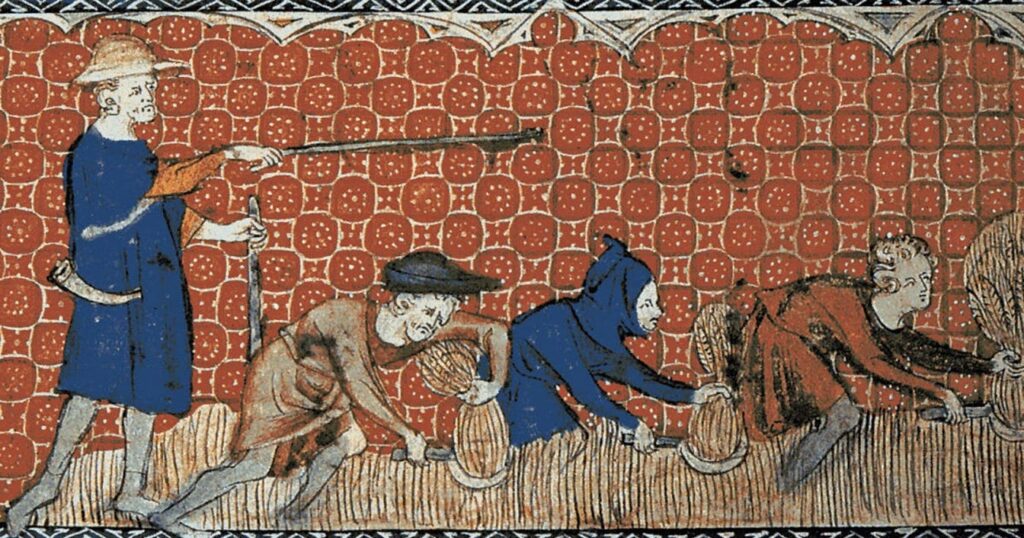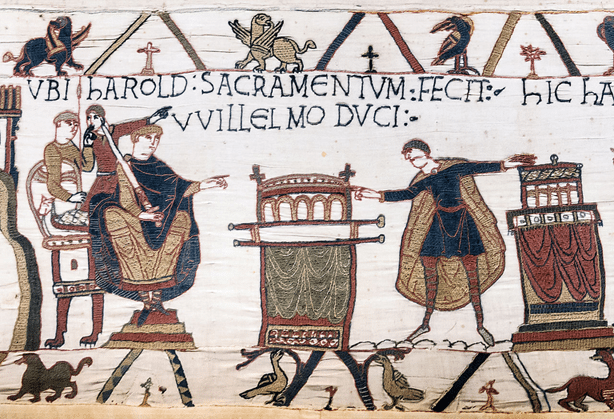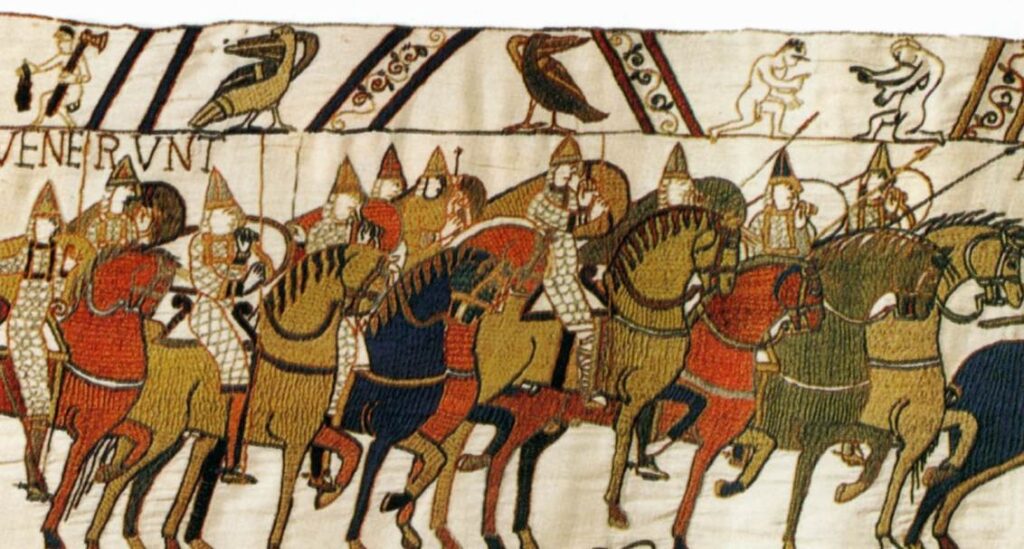Articles
Commentaries on Perry Anderson’s Passages from Antiquity to Feudalism and Lineages of the Absolutist State: Introduction
The three texts published here were written in the mid-1970s.
Some Notes on Perry Anderson
For Marx, the major determinants of historical change lay within the dominant mode of production of a specific social formation. The mode of production involves a labour process (elements: labour power, instruments, materials) carried on at a specific level of technological development by men who work within the context of a specific set of property relationships. In any social formation above physical subsistence level, there is an economic surplus. The strategic social relationship is that between social classes defined primarily (though not exclusively) by whether they control, or do not control, the means of production. Those who control the means of production form the dominant class, and appropriate the surplus. The kind of property relation that exists is itself a significant limiting factor on the kinds of technology that can be developed within a particular productive mode. It is mediated through ideological beliefs and cemented by institutions of domination, notably the state. Thus “the essential difference between the various economic formations of society … lies only in the form in which … surplus labour is in each case extracted from the direct producer, the labourer”.[i] It is this, according to Marx, that “determines the relationship of ruler and ruled … It is always the direct relation of the owners of the conditions of production to the direct producers – a relation always naturally corresponding to a definite stage in the development of the methods of labour and thus its social productivity – which reveals … the hidden basis of the whole social structure and with it … the corresponding specific form of the states”.[ii] Marx left a number of points unclear, notably the exact causal relations deemed to exist between the elements of his model. For instance, the base/superstructure formulation of the 1859 Preface gave the impression of a one-way determination of base on the ideological and political superstructure belied by his more detailed analyses elsewhere. He also left a number of problems unresolved, a major one being, as Marx himself said, “the relations of different state forms to different economic structures of society”.[iii]
The Marxism(s) of Our Time
“…. There is no true understanding without a certain range of comparison; provided, of course, that that comparison is based upon differing and at the same time related realities”.[1]
Critique of P. Anderson, Lineages of the Absolutist State
This book raises a vast range of problems. To make the paper manageable, I can only concentrate on the major argument: Anderson’s explanation of absolutism. I do not consider Book I, chapters 5 &. 6, Book II, chapter 7, and the two appendices. These deal with cases where neither absolutism nor the basic economic changes which Anderson relates to absolutism occur. If one argues that Anderson’s positive explanations of absolutism do not work, then the counter-factual function of these chapters disappears.
Review: Brendan McGeever, Antisemitism and the Russian Revolution
In January 1918, two months after Soviet power was established in Petrograd, one of the Red Guard units tasked with securing that power on the ruins of the Russian empire entered Hlukhiv, just over the Russian-Ukrainian border, north east of Kyiv. The unit was pushed out of Hlukhiv by the counter-revolutionary Ukrainian Baturinskii regiment within weeks – but soon joined forces with a group of Red partisans who had arrived from Kursk in southern Russia, and took the town back. A pogrom ensued. The Baturinskii regiment changed sides, claiming they had only resisted Soviet power because the “Yids” had paid them to. The Red Guards, thus reinforced, rampaged around the town proclaiming “eliminate the bourgeoisie and the Yids!”
Introduction to Abraham Serfaty’s Letter to the Damned of Israel
In October 1979, while he was locked up by the Hassan II government in the Kenitra prison, the Jewish Moroccan Marxist thinker and organiser Abraham Serfaty wrote a text about one of his main political educators, Abdellatif Zeroual, who had died under torture 5 years earlier. Serfaty had been arrested, alongside Abdellatif Lâabi, in 1972, because of his involvement in the Marxist-Leninist organisation Ilal al-Amam [Forward]. The two men were only freed in 1991. One of the lessons Zeroual had taught him, Serfaty writes, was the meaning of concrete proletarian internationalism. This meant that while the task of the Moroccan Left was to organise the Revolution within the Moroccan borders, this task was never to be detached from the broader Arab Revolution.[1] This lesson would remain central to Serfaty’s theory and praxis. Indeed, as an Arab Jew, he attached a great importance throughout his life to the national question as an important component of the wider international struggle.
Victor Serge: Three Writings on the Jewish Question and Antisemitism, 1943-47
By Way of an Introduction: The Middle Ages Chasing Us by Claudio Albertani
Power, Politics, and Personification
Toward a Critique of Postone’s Theory of Antisemitism
This essay offers an immanent critique of Moishe Postone’s theory of antisemitism, arguably among the most influential such theory of the past forty years.[1] Postone’s entire oeuvre is dedicated to the proposition that power in capitalist societies does not reside with agents but in a system of abstract domination. He explains modern antisemitism as what happens when people do not recognize the abstract nature of that system and instead hold that there must be someone—the Jews—in charge of things, responsible for all they fear and suffer. This phenomenon he proposes we understand as a form of fetishised anticapitalism.
Rootism, Modernity, and the Jew
Antisemitism and the Reactionary Imaginary, 1789-1945
The far-right identification of Jews with modernity has been noted by many scholars, some writing from a Marxist perspective, such as Enzo Traverso and Moishe Postone. Yet most analyses have fallen short of offering a properly dialectical account of antisemitism, one that will scrutinize the antinomies at the heart of the antisemitic discourse and trace their relations to the contradictions of modernity itself. In this paper, I will make modernity as movement the focus of the analysis.
Auschwitz and Hiroshima
Günther Anders
In a long autobiographical interview given to Mathias Greffrath in 1979, Günther Anders (Stern) indicated four major turning points that had marked his intellectual itinerary. First of all the Great War, which he had witnessed while still an adolescent and from which he learned what a massacre of millions of people was like: he would never forget the spectacle of mutilated soldiers and humiliation inflicted on civilians that he had witnessed in Alsace. Then Hitler’s rise to power in Germany in 1933: the event that forced him into exile. Finally, two great, almost contemporary tragedies, consummated during the Second World War, which he learned about in the United States in 1945: the genocide of the Jews in Europe and the atom bombing of Hiroshima and Nagasaki.[1] These events shaped his sensitivity, his vocation as a philosopher and intellectual, his thinking and perhaps even his style. The last one, the nuclear destruction of the Japanese cities, marked in his eyes the beginning of a new era, a sort of ‘zero hour’ (Stunde Null) for humanity, which discovered for the first time the concrete possibility of its own annihilation. From that moment on, Anders decided to devote the rest of his life to denouncing this terrible threat, conducting his battle like an isolated and unheard Cassandra, but always tenacious. A prophet of despair, Anders did not act as a representative of a community or a spokesman for a political movement, but only as a committed intellectual, an exile by necessity and a ‘citizen of the world’ by choice: first in Paris, then in New York, Los Angeles and finally Vienna, cities and countries that were never his true home. But ‘citizen of the world’ is not an entirely appropriate definition, one should probably speak of a ‘man without a world’ (Mensch ohne Welt), using the formula he himself had forged to indicate a tradition initiated by Kafka, Brecht, Döblin and Grosz, to which he implicitly subscribed.[2]
Revisiting the ‘Jewish Question’ and Its Contemporary Discontents
As this article is being written, the world is confronting a global pandemic that continues to wreak havoc daily. While unprecedented in several respects, the pandemic mirrors earlier crises under financialised capitalism, at least in its devastating impact upon the global working poor and the unemployed, racialised minorities, migrant workers, and other marginalised groups. The pandemic has also been accompanied by a spate of anti-Jewish and anti-Asian violence globally. To be sure, racist-based violence and hate crimes had a long and sordid history before the pandemic. In 2019, a German neo-fascist killed two people outside a Halle synagogue in a deliberate attempt to carry out a murderous rampage against Jews. A year earlier, another neo-fascist was responsible for killing 11 Jewish worshippers and injuring six others at the Tree of Life Synagogue in Pittsburgh. In addition to these horrific acts of antisemitic violence, there has been a general spike in hate crimes against Jews across Europe and North America, which has given renewed force to contemporary discussions about antisemitism and the ‘Jewish Question’.[1] In the Marxist tradition, the debate about the Jewish Question originates in the nineteenth century, prompted as it was by Marx’s well-known critique of Bruno Bauer’s book, Die Judenfrage (The Jewish Question). The current iteration of this debate is complicated by a host of multi-layered and conflicting realities. These realities include the enduring legacies of the Holocaust, the Nakba, the consolidation of the Israeli state, the struggle of Palestinians for self-determination amidst a brutal occupation, as well as a global political context in which xenophobic nationalisms and neo-fascisms have resurfaced with a vengeance.












